Effectiveness of Mindfulness-Based Interventions for Substance Abuse
VerifiedAdded on 2022/10/15
|7
|1763
|454
Literature Review
AI Summary
This literature review, based on the work of Chiesa and Serretti (2014), investigates the effectiveness of mindfulness-based interventions in treating substance use disorders. The review analyzed 24 studies, revealing that mindfulness interventions can reduce the consumption of alcohol, cigarettes, and other substances, as well as decrease cravings. The review highlights the link between substance abuse and increased risks of physical and mental health conditions. The methodology involved searching electronic databases, applying inclusion and exclusion criteria, and assessing study quality using the Jadad scale. The review found that mindfulness-based interventions are effective in improving mental health outcomes and reducing the rate of substance abuse and related health issues. The review also discusses the psychological and neurological mechanisms behind the effectiveness of mindfulness, suggesting that mindfulness can be a natural state of mind that can be leveraged to reduce the consumption of alcohol and other drugs and prevent the development of mental health conditions. The review references several other studies supporting the therapeutic benefits of mindfulness in the context of substance abuse.
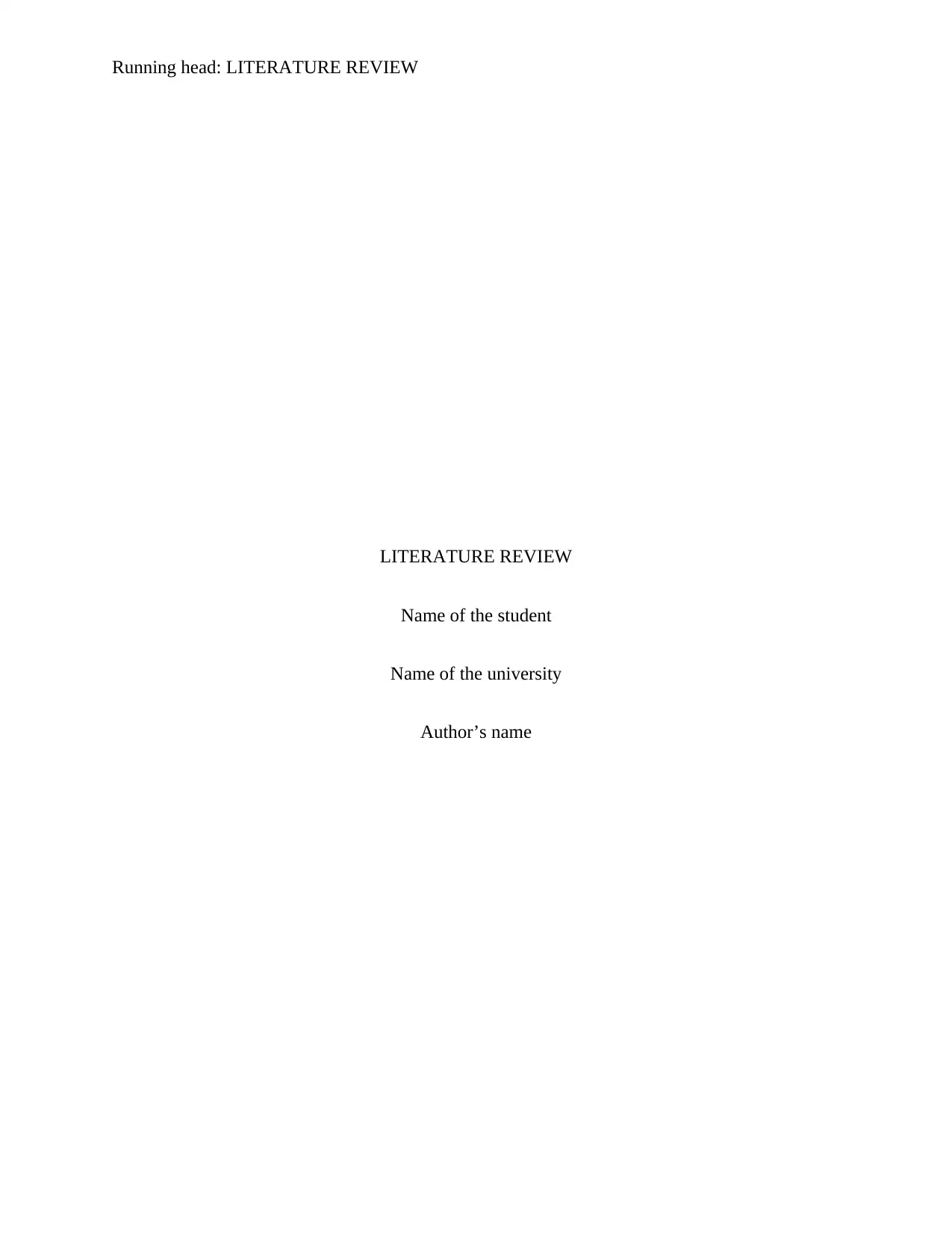
Running head: LITERATURE REVIEW
LITERATURE REVIEW
Name of the student
Name of the university
Author’s name
LITERATURE REVIEW
Name of the student
Name of the university
Author’s name
Paraphrase This Document
Need a fresh take? Get an instant paraphrase of this document with our AI Paraphraser
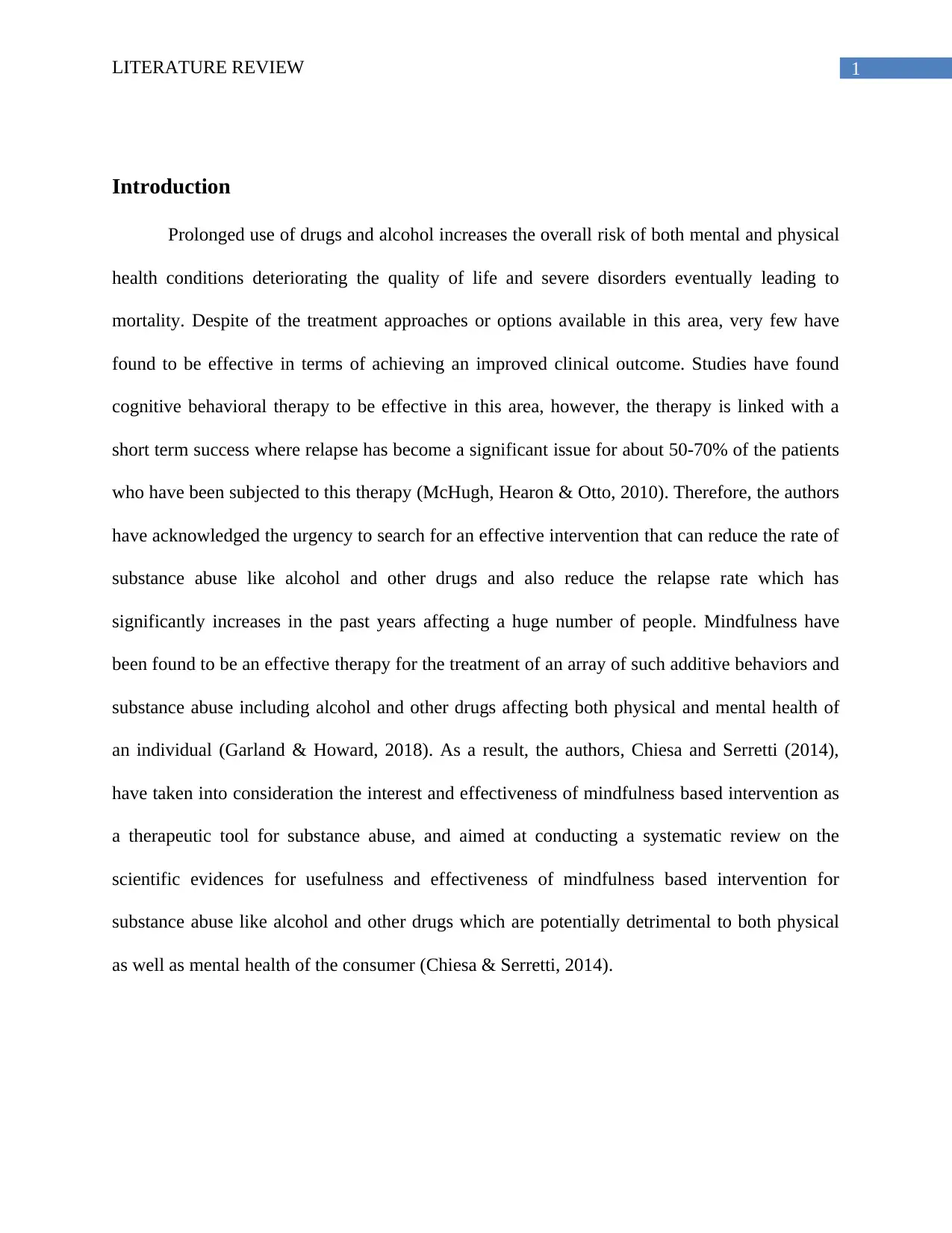
1LITERATURE REVIEW
Introduction
Prolonged use of drugs and alcohol increases the overall risk of both mental and physical
health conditions deteriorating the quality of life and severe disorders eventually leading to
mortality. Despite of the treatment approaches or options available in this area, very few have
found to be effective in terms of achieving an improved clinical outcome. Studies have found
cognitive behavioral therapy to be effective in this area, however, the therapy is linked with a
short term success where relapse has become a significant issue for about 50-70% of the patients
who have been subjected to this therapy (McHugh, Hearon & Otto, 2010). Therefore, the authors
have acknowledged the urgency to search for an effective intervention that can reduce the rate of
substance abuse like alcohol and other drugs and also reduce the relapse rate which has
significantly increases in the past years affecting a huge number of people. Mindfulness have
been found to be an effective therapy for the treatment of an array of such additive behaviors and
substance abuse including alcohol and other drugs affecting both physical and mental health of
an individual (Garland & Howard, 2018). As a result, the authors, Chiesa and Serretti (2014),
have taken into consideration the interest and effectiveness of mindfulness based intervention as
a therapeutic tool for substance abuse, and aimed at conducting a systematic review on the
scientific evidences for usefulness and effectiveness of mindfulness based intervention for
substance abuse like alcohol and other drugs which are potentially detrimental to both physical
as well as mental health of the consumer (Chiesa & Serretti, 2014).
Introduction
Prolonged use of drugs and alcohol increases the overall risk of both mental and physical
health conditions deteriorating the quality of life and severe disorders eventually leading to
mortality. Despite of the treatment approaches or options available in this area, very few have
found to be effective in terms of achieving an improved clinical outcome. Studies have found
cognitive behavioral therapy to be effective in this area, however, the therapy is linked with a
short term success where relapse has become a significant issue for about 50-70% of the patients
who have been subjected to this therapy (McHugh, Hearon & Otto, 2010). Therefore, the authors
have acknowledged the urgency to search for an effective intervention that can reduce the rate of
substance abuse like alcohol and other drugs and also reduce the relapse rate which has
significantly increases in the past years affecting a huge number of people. Mindfulness have
been found to be an effective therapy for the treatment of an array of such additive behaviors and
substance abuse including alcohol and other drugs affecting both physical and mental health of
an individual (Garland & Howard, 2018). As a result, the authors, Chiesa and Serretti (2014),
have taken into consideration the interest and effectiveness of mindfulness based intervention as
a therapeutic tool for substance abuse, and aimed at conducting a systematic review on the
scientific evidences for usefulness and effectiveness of mindfulness based intervention for
substance abuse like alcohol and other drugs which are potentially detrimental to both physical
as well as mental health of the consumer (Chiesa & Serretti, 2014).
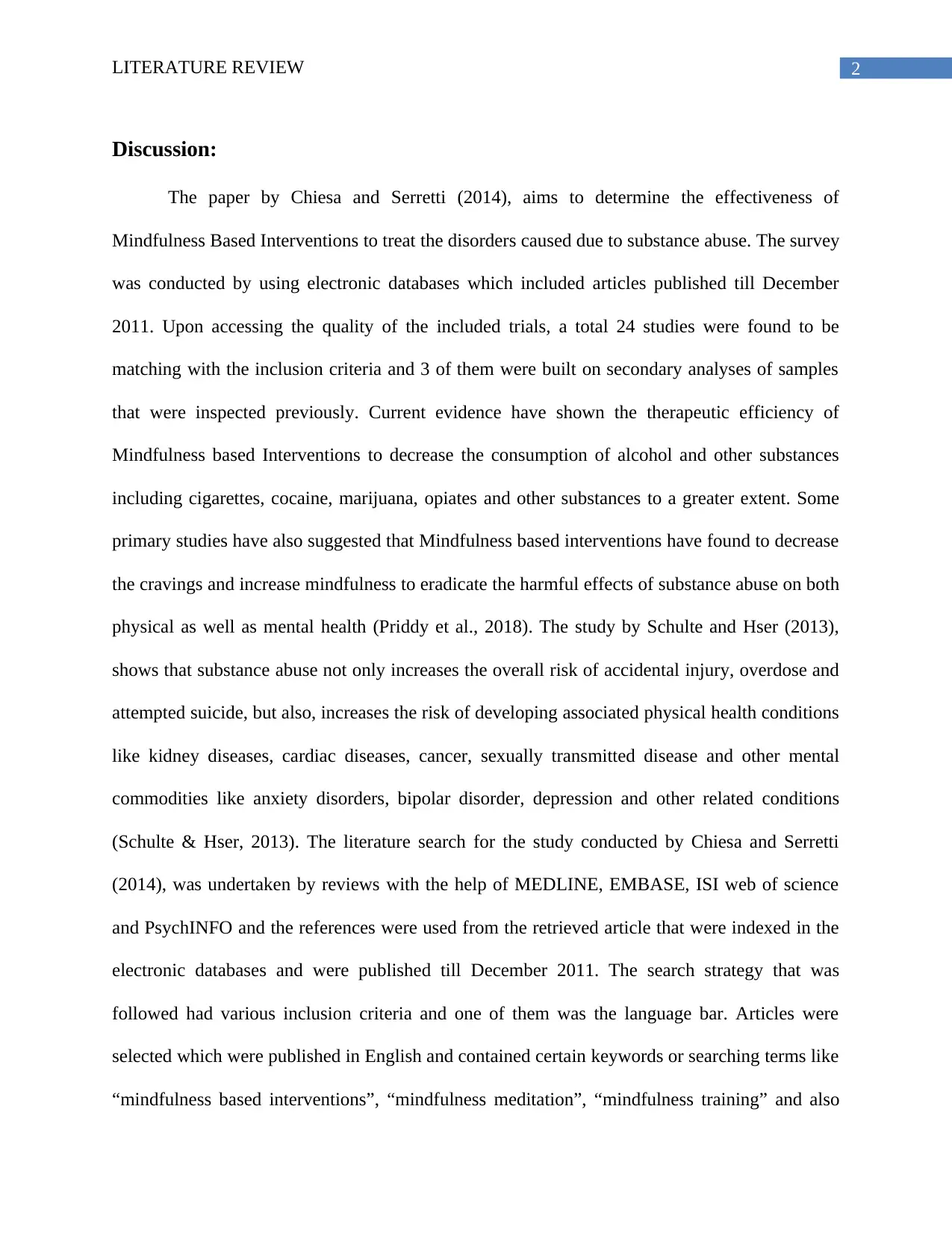
2LITERATURE REVIEW
Discussion:
The paper by Chiesa and Serretti (2014), aims to determine the effectiveness of
Mindfulness Based Interventions to treat the disorders caused due to substance abuse. The survey
was conducted by using electronic databases which included articles published till December
2011. Upon accessing the quality of the included trials, a total 24 studies were found to be
matching with the inclusion criteria and 3 of them were built on secondary analyses of samples
that were inspected previously. Current evidence have shown the therapeutic efficiency of
Mindfulness based Interventions to decrease the consumption of alcohol and other substances
including cigarettes, cocaine, marijuana, opiates and other substances to a greater extent. Some
primary studies have also suggested that Mindfulness based interventions have found to decrease
the cravings and increase mindfulness to eradicate the harmful effects of substance abuse on both
physical as well as mental health (Priddy et al., 2018). The study by Schulte and Hser (2013),
shows that substance abuse not only increases the overall risk of accidental injury, overdose and
attempted suicide, but also, increases the risk of developing associated physical health conditions
like kidney diseases, cardiac diseases, cancer, sexually transmitted disease and other mental
commodities like anxiety disorders, bipolar disorder, depression and other related conditions
(Schulte & Hser, 2013). The literature search for the study conducted by Chiesa and Serretti
(2014), was undertaken by reviews with the help of MEDLINE, EMBASE, ISI web of science
and PsychINFO and the references were used from the retrieved article that were indexed in the
electronic databases and were published till December 2011. The search strategy that was
followed had various inclusion criteria and one of them was the language bar. Articles were
selected which were published in English and contained certain keywords or searching terms like
“mindfulness based interventions”, “mindfulness meditation”, “mindfulness training” and also
Discussion:
The paper by Chiesa and Serretti (2014), aims to determine the effectiveness of
Mindfulness Based Interventions to treat the disorders caused due to substance abuse. The survey
was conducted by using electronic databases which included articles published till December
2011. Upon accessing the quality of the included trials, a total 24 studies were found to be
matching with the inclusion criteria and 3 of them were built on secondary analyses of samples
that were inspected previously. Current evidence have shown the therapeutic efficiency of
Mindfulness based Interventions to decrease the consumption of alcohol and other substances
including cigarettes, cocaine, marijuana, opiates and other substances to a greater extent. Some
primary studies have also suggested that Mindfulness based interventions have found to decrease
the cravings and increase mindfulness to eradicate the harmful effects of substance abuse on both
physical as well as mental health (Priddy et al., 2018). The study by Schulte and Hser (2013),
shows that substance abuse not only increases the overall risk of accidental injury, overdose and
attempted suicide, but also, increases the risk of developing associated physical health conditions
like kidney diseases, cardiac diseases, cancer, sexually transmitted disease and other mental
commodities like anxiety disorders, bipolar disorder, depression and other related conditions
(Schulte & Hser, 2013). The literature search for the study conducted by Chiesa and Serretti
(2014), was undertaken by reviews with the help of MEDLINE, EMBASE, ISI web of science
and PsychINFO and the references were used from the retrieved article that were indexed in the
electronic databases and were published till December 2011. The search strategy that was
followed had various inclusion criteria and one of them was the language bar. Articles were
selected which were published in English and contained certain keywords or searching terms like
“mindfulness based interventions”, “mindfulness meditation”, “mindfulness training” and also
⊘ This is a preview!⊘
Do you want full access?
Subscribe today to unlock all pages.

Trusted by 1+ million students worldwide
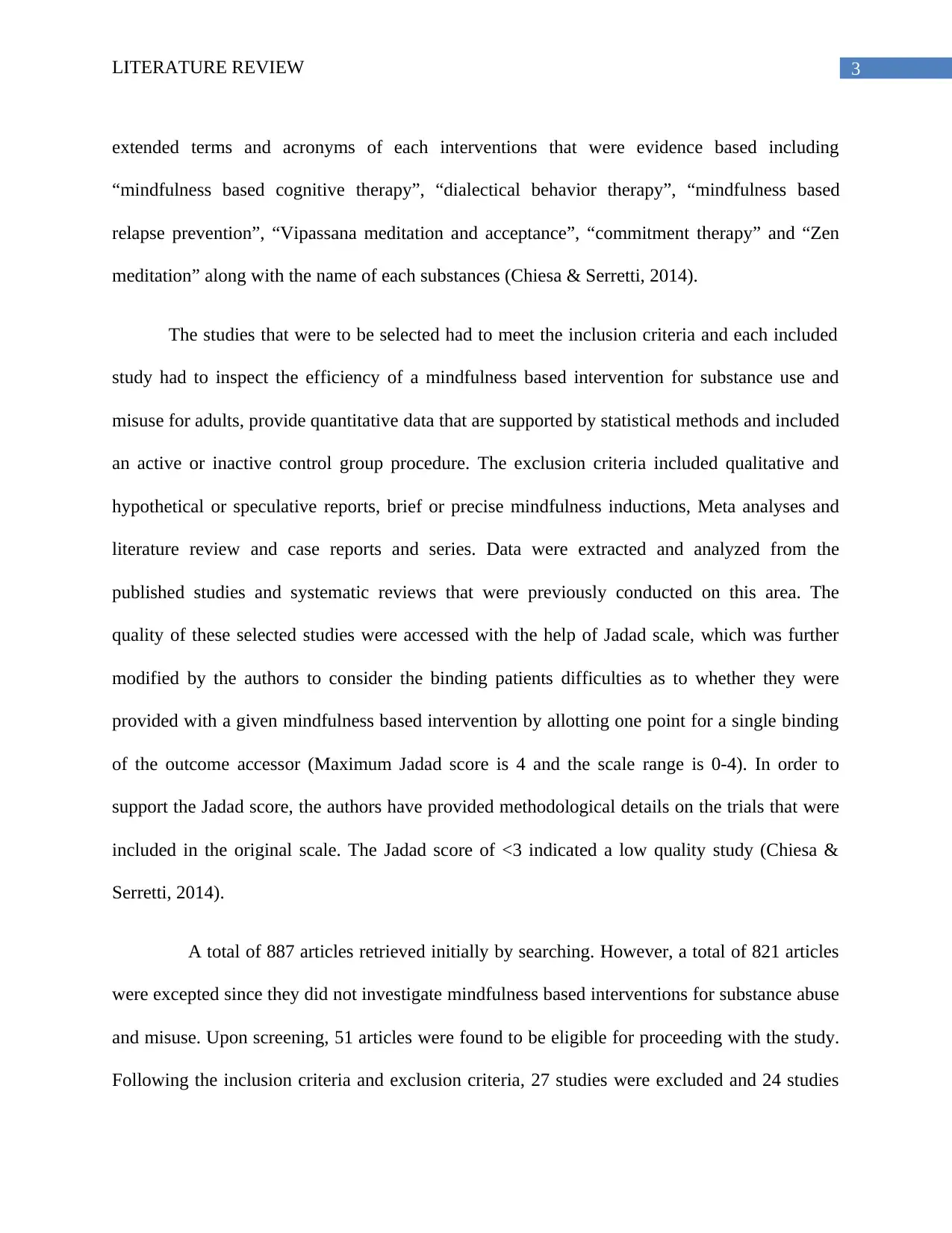
3LITERATURE REVIEW
extended terms and acronyms of each interventions that were evidence based including
“mindfulness based cognitive therapy”, “dialectical behavior therapy”, “mindfulness based
relapse prevention”, “Vipassana meditation and acceptance”, “commitment therapy” and “Zen
meditation” along with the name of each substances (Chiesa & Serretti, 2014).
The studies that were to be selected had to meet the inclusion criteria and each included
study had to inspect the efficiency of a mindfulness based intervention for substance use and
misuse for adults, provide quantitative data that are supported by statistical methods and included
an active or inactive control group procedure. The exclusion criteria included qualitative and
hypothetical or speculative reports, brief or precise mindfulness inductions, Meta analyses and
literature review and case reports and series. Data were extracted and analyzed from the
published studies and systematic reviews that were previously conducted on this area. The
quality of these selected studies were accessed with the help of Jadad scale, which was further
modified by the authors to consider the binding patients difficulties as to whether they were
provided with a given mindfulness based intervention by allotting one point for a single binding
of the outcome accessor (Maximum Jadad score is 4 and the scale range is 0-4). In order to
support the Jadad score, the authors have provided methodological details on the trials that were
included in the original scale. The Jadad score of <3 indicated a low quality study (Chiesa &
Serretti, 2014).
A total of 887 articles retrieved initially by searching. However, a total of 821 articles
were excepted since they did not investigate mindfulness based interventions for substance abuse
and misuse. Upon screening, 51 articles were found to be eligible for proceeding with the study.
Following the inclusion criteria and exclusion criteria, 27 studies were excluded and 24 studies
extended terms and acronyms of each interventions that were evidence based including
“mindfulness based cognitive therapy”, “dialectical behavior therapy”, “mindfulness based
relapse prevention”, “Vipassana meditation and acceptance”, “commitment therapy” and “Zen
meditation” along with the name of each substances (Chiesa & Serretti, 2014).
The studies that were to be selected had to meet the inclusion criteria and each included
study had to inspect the efficiency of a mindfulness based intervention for substance use and
misuse for adults, provide quantitative data that are supported by statistical methods and included
an active or inactive control group procedure. The exclusion criteria included qualitative and
hypothetical or speculative reports, brief or precise mindfulness inductions, Meta analyses and
literature review and case reports and series. Data were extracted and analyzed from the
published studies and systematic reviews that were previously conducted on this area. The
quality of these selected studies were accessed with the help of Jadad scale, which was further
modified by the authors to consider the binding patients difficulties as to whether they were
provided with a given mindfulness based intervention by allotting one point for a single binding
of the outcome accessor (Maximum Jadad score is 4 and the scale range is 0-4). In order to
support the Jadad score, the authors have provided methodological details on the trials that were
included in the original scale. The Jadad score of <3 indicated a low quality study (Chiesa &
Serretti, 2014).
A total of 887 articles retrieved initially by searching. However, a total of 821 articles
were excepted since they did not investigate mindfulness based interventions for substance abuse
and misuse. Upon screening, 51 articles were found to be eligible for proceeding with the study.
Following the inclusion criteria and exclusion criteria, 27 studies were excluded and 24 studies
Paraphrase This Document
Need a fresh take? Get an instant paraphrase of this document with our AI Paraphraser
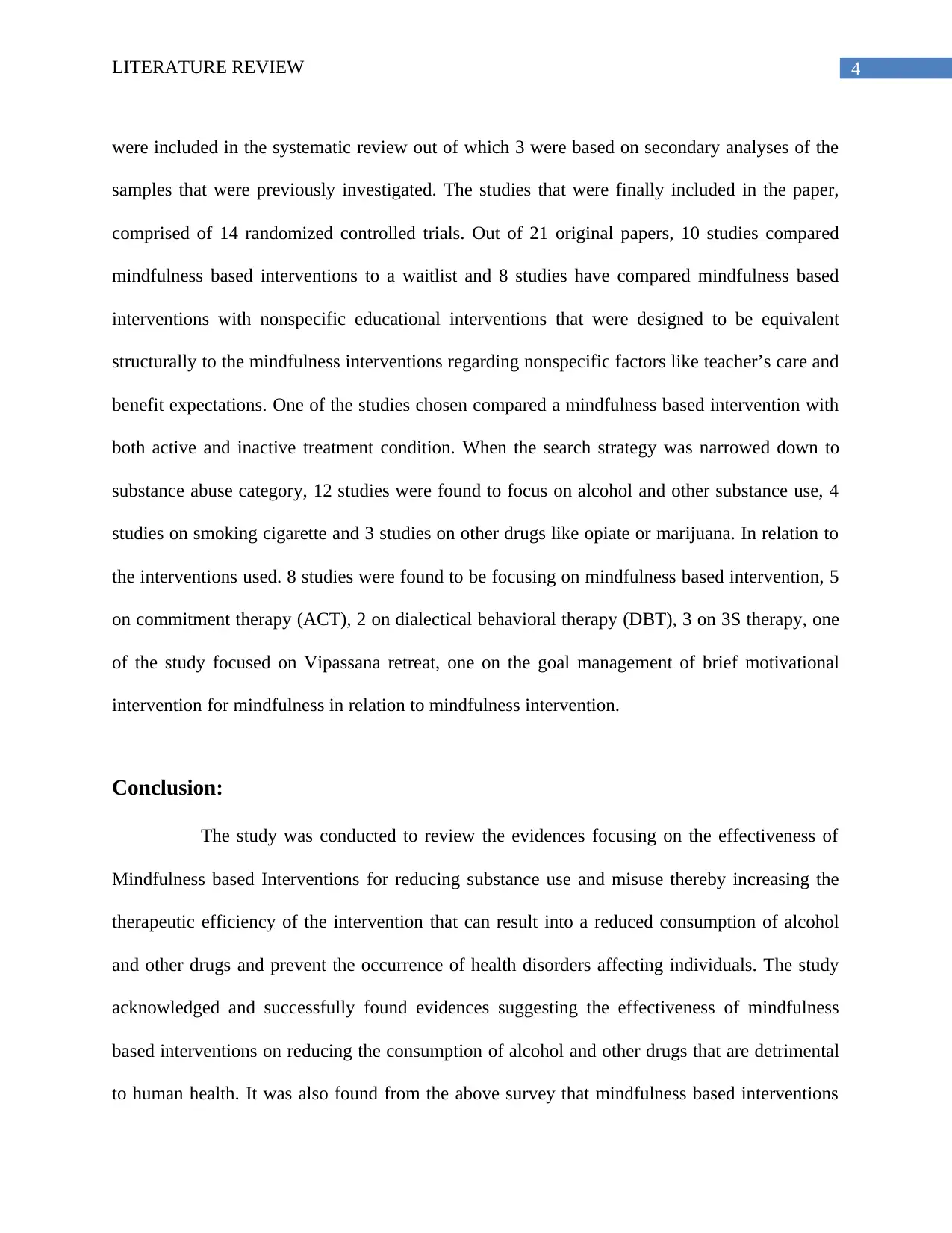
4LITERATURE REVIEW
were included in the systematic review out of which 3 were based on secondary analyses of the
samples that were previously investigated. The studies that were finally included in the paper,
comprised of 14 randomized controlled trials. Out of 21 original papers, 10 studies compared
mindfulness based interventions to a waitlist and 8 studies have compared mindfulness based
interventions with nonspecific educational interventions that were designed to be equivalent
structurally to the mindfulness interventions regarding nonspecific factors like teacher’s care and
benefit expectations. One of the studies chosen compared a mindfulness based intervention with
both active and inactive treatment condition. When the search strategy was narrowed down to
substance abuse category, 12 studies were found to focus on alcohol and other substance use, 4
studies on smoking cigarette and 3 studies on other drugs like opiate or marijuana. In relation to
the interventions used. 8 studies were found to be focusing on mindfulness based intervention, 5
on commitment therapy (ACT), 2 on dialectical behavioral therapy (DBT), 3 on 3S therapy, one
of the study focused on Vipassana retreat, one on the goal management of brief motivational
intervention for mindfulness in relation to mindfulness intervention.
Conclusion:
The study was conducted to review the evidences focusing on the effectiveness of
Mindfulness based Interventions for reducing substance use and misuse thereby increasing the
therapeutic efficiency of the intervention that can result into a reduced consumption of alcohol
and other drugs and prevent the occurrence of health disorders affecting individuals. The study
acknowledged and successfully found evidences suggesting the effectiveness of mindfulness
based interventions on reducing the consumption of alcohol and other drugs that are detrimental
to human health. It was also found from the above survey that mindfulness based interventions
were included in the systematic review out of which 3 were based on secondary analyses of the
samples that were previously investigated. The studies that were finally included in the paper,
comprised of 14 randomized controlled trials. Out of 21 original papers, 10 studies compared
mindfulness based interventions to a waitlist and 8 studies have compared mindfulness based
interventions with nonspecific educational interventions that were designed to be equivalent
structurally to the mindfulness interventions regarding nonspecific factors like teacher’s care and
benefit expectations. One of the studies chosen compared a mindfulness based intervention with
both active and inactive treatment condition. When the search strategy was narrowed down to
substance abuse category, 12 studies were found to focus on alcohol and other substance use, 4
studies on smoking cigarette and 3 studies on other drugs like opiate or marijuana. In relation to
the interventions used. 8 studies were found to be focusing on mindfulness based intervention, 5
on commitment therapy (ACT), 2 on dialectical behavioral therapy (DBT), 3 on 3S therapy, one
of the study focused on Vipassana retreat, one on the goal management of brief motivational
intervention for mindfulness in relation to mindfulness intervention.
Conclusion:
The study was conducted to review the evidences focusing on the effectiveness of
Mindfulness based Interventions for reducing substance use and misuse thereby increasing the
therapeutic efficiency of the intervention that can result into a reduced consumption of alcohol
and other drugs and prevent the occurrence of health disorders affecting individuals. The study
acknowledged and successfully found evidences suggesting the effectiveness of mindfulness
based interventions on reducing the consumption of alcohol and other drugs that are detrimental
to human health. It was also found from the above survey that mindfulness based interventions
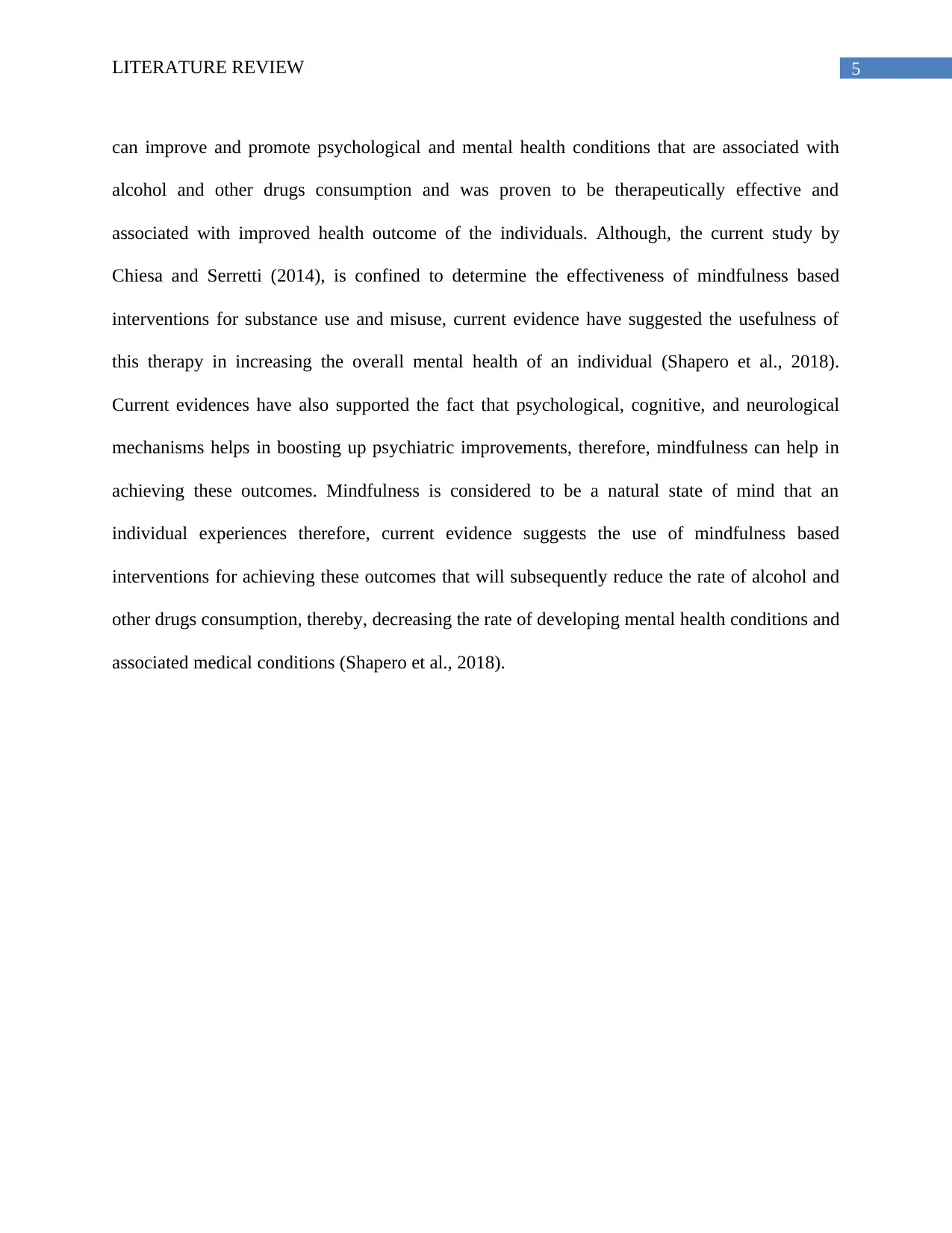
5LITERATURE REVIEW
can improve and promote psychological and mental health conditions that are associated with
alcohol and other drugs consumption and was proven to be therapeutically effective and
associated with improved health outcome of the individuals. Although, the current study by
Chiesa and Serretti (2014), is confined to determine the effectiveness of mindfulness based
interventions for substance use and misuse, current evidence have suggested the usefulness of
this therapy in increasing the overall mental health of an individual (Shapero et al., 2018).
Current evidences have also supported the fact that psychological, cognitive, and neurological
mechanisms helps in boosting up psychiatric improvements, therefore, mindfulness can help in
achieving these outcomes. Mindfulness is considered to be a natural state of mind that an
individual experiences therefore, current evidence suggests the use of mindfulness based
interventions for achieving these outcomes that will subsequently reduce the rate of alcohol and
other drugs consumption, thereby, decreasing the rate of developing mental health conditions and
associated medical conditions (Shapero et al., 2018).
can improve and promote psychological and mental health conditions that are associated with
alcohol and other drugs consumption and was proven to be therapeutically effective and
associated with improved health outcome of the individuals. Although, the current study by
Chiesa and Serretti (2014), is confined to determine the effectiveness of mindfulness based
interventions for substance use and misuse, current evidence have suggested the usefulness of
this therapy in increasing the overall mental health of an individual (Shapero et al., 2018).
Current evidences have also supported the fact that psychological, cognitive, and neurological
mechanisms helps in boosting up psychiatric improvements, therefore, mindfulness can help in
achieving these outcomes. Mindfulness is considered to be a natural state of mind that an
individual experiences therefore, current evidence suggests the use of mindfulness based
interventions for achieving these outcomes that will subsequently reduce the rate of alcohol and
other drugs consumption, thereby, decreasing the rate of developing mental health conditions and
associated medical conditions (Shapero et al., 2018).
⊘ This is a preview!⊘
Do you want full access?
Subscribe today to unlock all pages.

Trusted by 1+ million students worldwide
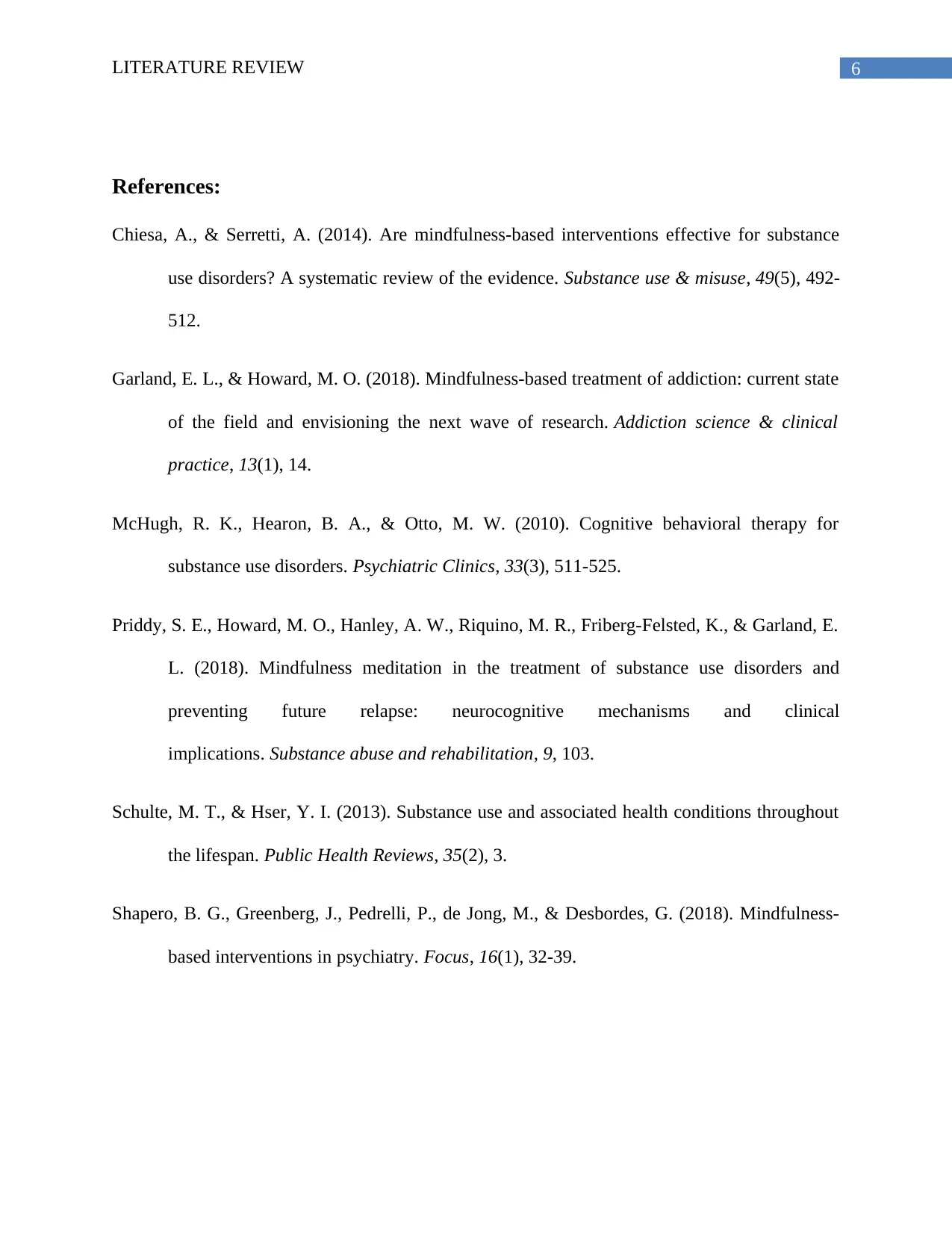
6LITERATURE REVIEW
References:
Chiesa, A., & Serretti, A. (2014). Are mindfulness-based interventions effective for substance
use disorders? A systematic review of the evidence. Substance use & misuse, 49(5), 492-
512.
Garland, E. L., & Howard, M. O. (2018). Mindfulness-based treatment of addiction: current state
of the field and envisioning the next wave of research. Addiction science & clinical
practice, 13(1), 14.
McHugh, R. K., Hearon, B. A., & Otto, M. W. (2010). Cognitive behavioral therapy for
substance use disorders. Psychiatric Clinics, 33(3), 511-525.
Priddy, S. E., Howard, M. O., Hanley, A. W., Riquino, M. R., Friberg-Felsted, K., & Garland, E.
L. (2018). Mindfulness meditation in the treatment of substance use disorders and
preventing future relapse: neurocognitive mechanisms and clinical
implications. Substance abuse and rehabilitation, 9, 103.
Schulte, M. T., & Hser, Y. I. (2013). Substance use and associated health conditions throughout
the lifespan. Public Health Reviews, 35(2), 3.
Shapero, B. G., Greenberg, J., Pedrelli, P., de Jong, M., & Desbordes, G. (2018). Mindfulness-
based interventions in psychiatry. Focus, 16(1), 32-39.
References:
Chiesa, A., & Serretti, A. (2014). Are mindfulness-based interventions effective for substance
use disorders? A systematic review of the evidence. Substance use & misuse, 49(5), 492-
512.
Garland, E. L., & Howard, M. O. (2018). Mindfulness-based treatment of addiction: current state
of the field and envisioning the next wave of research. Addiction science & clinical
practice, 13(1), 14.
McHugh, R. K., Hearon, B. A., & Otto, M. W. (2010). Cognitive behavioral therapy for
substance use disorders. Psychiatric Clinics, 33(3), 511-525.
Priddy, S. E., Howard, M. O., Hanley, A. W., Riquino, M. R., Friberg-Felsted, K., & Garland, E.
L. (2018). Mindfulness meditation in the treatment of substance use disorders and
preventing future relapse: neurocognitive mechanisms and clinical
implications. Substance abuse and rehabilitation, 9, 103.
Schulte, M. T., & Hser, Y. I. (2013). Substance use and associated health conditions throughout
the lifespan. Public Health Reviews, 35(2), 3.
Shapero, B. G., Greenberg, J., Pedrelli, P., de Jong, M., & Desbordes, G. (2018). Mindfulness-
based interventions in psychiatry. Focus, 16(1), 32-39.
1 out of 7
Related Documents
Your All-in-One AI-Powered Toolkit for Academic Success.
+13062052269
info@desklib.com
Available 24*7 on WhatsApp / Email
![[object Object]](/_next/static/media/star-bottom.7253800d.svg)
Unlock your academic potential
Copyright © 2020–2025 A2Z Services. All Rights Reserved. Developed and managed by ZUCOL.




